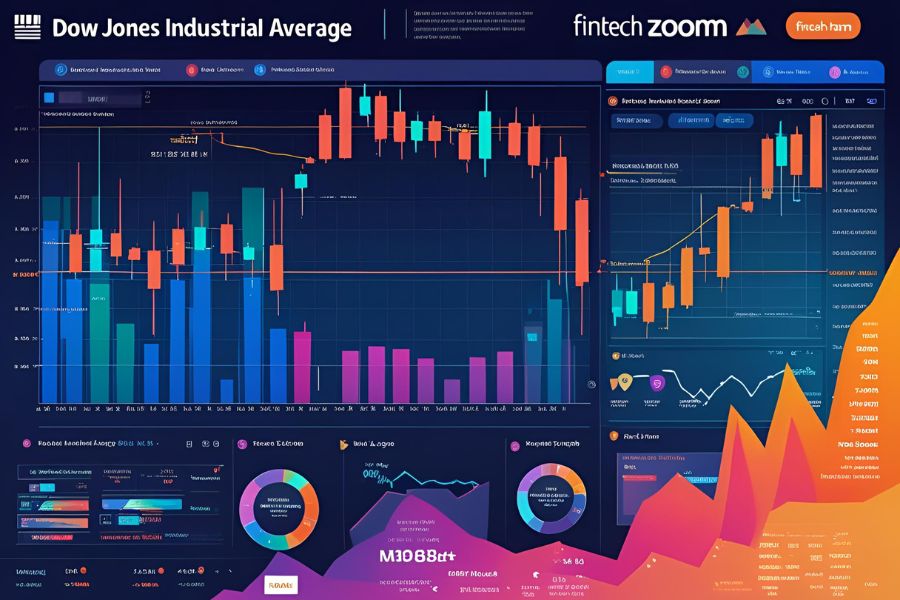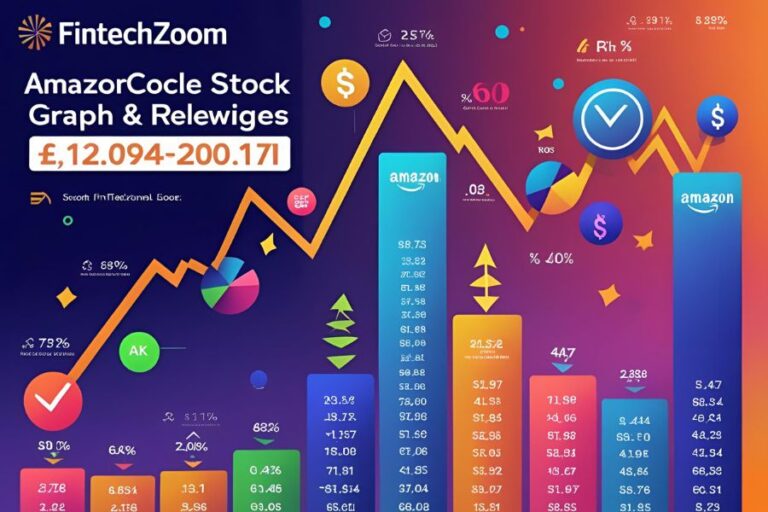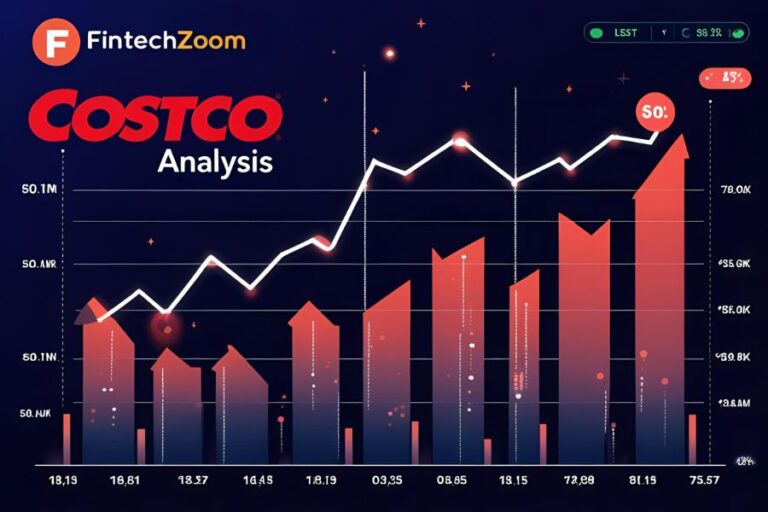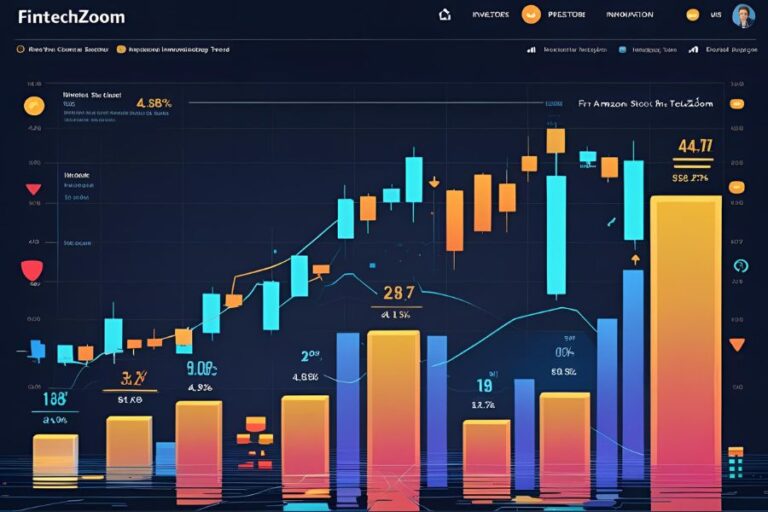Dow Jones FintechZoom: Latest Market Insights, Trends, and Analysis
Real-time data and smart analytics in financial markets help investors choose better. Financial news is live and market trends are followed by FintechZoom. FintechZoom helps users spot good investment opportunities. FintechZoom is a popular site to keep an eye on the stock indices such as Dow Jones.
New and expert investors can both benefit from FintechZoom. It’s a bridge between old investing ways and new fintech tools. It includes tracking how fintech is changing the Dow Jones Industrial Average. In short, the FintechZoom makes investing easier to follow and to improve your investment strategy.
- FintechZoom Dow Jones Core Offerings
- The Dow Jones and Blue-Chip Companies
- The Dow Jones Industrial Average: A Core Element in Financial Markets
- How Does Fintech Impact the Dow Jones Industrial Average?
- The Role of FintechZoom in Investing in Dow Jones
- What Is DJIA?
- Pros of Investing in Index Companies
- Cons of Investing in Index Companies
- Which Companies Are Included in the Dow Jones FintechZoom?
- Investing Strategies with Dow Jones FintechZoom
- Comparing DJIA to Other Stock Market Indices
- Key Factors Influencing Dow Jones Industrial Average Performance
- Predictions for FintechZoom’s Future Growth
- Conclusion
FintechZoom Dow Jones Core Offerings
- Real-time Data: The real-time data on stocks, bonds, cryptocurrencies and Dow Jones FintechZoom can be accessed by investors.
- Market Analysis: FintechZoom provides comprehensive analysis on current fintech innovations impacting the market. And offering insights on market trends, economic shifts, and technological advancements.
- Educational Content: With FintechZoom educational articles, expert interviews, and webinars, Fintech Zoom ensures that users understand the complexities of the financial markets.
- Tracking Financial Assets: On FintechZoom, investors can track stock prices, monitor how their portfolios are performing. And always be up to date about important economic indicators.
The Dow Jones and Blue-Chip Companies
Dow Jones Industrial Average is a stock market index that shows how 30 large U.S. companies are performing. The index is one of the earliest and most closely followed stock indexes in the world. Investors use it to understand how the overall market is doing. These companies come from different industries.
Trusted businesses with a history of solid results are blue chip companies. They are famous for their consistent earnings and consistent dividends. Many of them are part of the Dow Jones. Investors often choose these companies because they are safer and more stable than smaller firms. They are a key part of long-term plans.
The Dow Jones Industrial Average: A Core Element in Financial Markets
A major stock index, the Dow Jones Industrial Average (DJIA), tracks the performance of the 30 leading U.S. companies. FintechZoom provides specialized fintech insights and tools that help investors to follow changes in the DJIA and better understand market trends and behavior.
Investing in the Dow Jones Industrial Average gives investors a way to own a diversified portfolio of the leading U.S. companies. Investors can get a general view of how the stock market is doing and how the economy is feeling in general, by monitoring the DJIA. However, the inclusion of fintech within the Dow Jones’s performance metrics is something that’s becoming increasingly important.
How Does Fintech Impact the Dow Jones Industrial Average?
Fintech has changed how markets operate. Even major indexes like the DJIA have felt the impact. E-commerce, digital payment and AI are among the fast growing Fintech companies. Many are part of the Dow Jones FintechZoom and help to shape market trends and the economy.
Companies like Apple, Microsoft, and Visa use fintech tools like blockchain, digital payments, and online banking. This helps them work better, get more customers, and make more money. Their rise shows how important fintech has become in modern financial markets.
The Role of FintechZoom in Investing in Dow Jones
In the context of FintechZoom and Dow Jones FintechZoom, several related topics help.
- Stock Market Trends: Investors can use FintechZoom to track trends in stock market movements. Especially how fintech companies within the DJIA are performing.
- Real-Time Market Data: FintechZoom delivers real-time market updates, allowing users to make informed and confident investment choices.
- Financial Technologies: From digital wallets to robo-advisors, FintechZoom covers a range of emerging financial technologies that are disrupting traditional financial services.
- Market Analysis: FintechZoom uses advanced analytics to offer insights into the financial markets, helping investors navigate complex data.
- Blockchain and Cryptocurrency: Blockchain and cryptocurrency have played a major role in driving the fintech revolution forward. FintechZoom tracks developments in these areas and how they are influencing the Dow Jones FintechZoom.
What Is DJIA?
The Dow Jones Industrial Average (DJIA) is a market index that follows the performance of 30 leading U.S. companies. It measures the performance of these large companies across different industries, reflecting the overall health of the U.S. economy. Famous companies such as Apple, Coca-Cola, and Boeing are part of the DJIA.
Investors and analysts often use the DJIA to gauge market trends. The stock market index of the DJIA is one of the oldest and most popular. It is price-weighted, so companies with higher stock prices have a greater impact on the index’s changes. This index helps people understand how the stock market is performing.
Pros of Investing in Index Companies
Diversification
Index funds allow you to invest in a large group of companies – and that’s a good thing. Because you’re not putting all your money in a single stock.
Low Fees
Generally, index funds have lower management fees. Compared to actively managed funds.
Stable Growth:
Index funds tend to reflect overall market growth, making them a reliable long-term investment.
Simplicity
It’s easy to invest in an index without needing to pick individual stocks or perform deep research.
Market Performance
Index funds track the performance of top companies, which often leads to solid returns over time.
Cons of Investing in Index Companies
Limited Growth Potential
The index includes established companies, which may limit high-growth opportunities.
Overexposure to Large Companies
Investing in an index can lead to overexposure to a few large-cap stocks, potentially skewing returns.
Lack of Flexibility
Index investing offers no control over the specific companies you invest in, limiting customization.
Market Risk
When the overall market performs poorly, index funds can also experience significant losses.
Underperformance
In some market conditions, an index fund may lag behind actively managed funds in performance.
Which Companies Are Included in the Dow Jones FintechZoom?
Below is a detailed table featuring the 30 publicly traded U.S. companies included in the Dow Jones FintechZoom index.
| Company | Ticker Symbol | Industry |
| 3M | MMM | Conglomerate |
| American Express | AXP | Financial Services |
| Amgen | AMGN | Biotechnology |
| Apple | AAPL | Technology |
| Boeing | BA | Aerospace & Defense |
| Caterpillar | CAT | Industrials |
| Chevron | CVX | Energy |
| Cisco Systems | CSCO | Technology |
| Coca-Cola | KO | Beverages |
| Dow | DOW | Chemicals |
| Goldman Sachs | GS | Financial Services |
| The Home Depot | HD | Retail |
| Honeywell | HON | Conglomerate |
| IBM | IBM | Technology |
| Intel | INTC | Technology |
| Johnson & Johnson | JNJ | Pharmaceuticals |
| JPMorgan Chase | JPM | Financial Services |
| McDonald’s | MCD | Restaurants |
| Merck & Co. | MRK | Pharmaceuticals |
| Microsoft | MSFT | Technology |
| Nike | NKE | Apparel |
| Procter & Gamble | PG | Consumer Goods |
| Salesforce | CRM | Cloud Computing |
| The Travelers Companies | TRV | Insurance |
| UnitedHealth Group | UNH | Healthcare |
| Verizon | VZ | Telecommunications |
| Visa | V | Financial Services |
| Walgreens Boots Alliance | WBA | Retail |
| Walmart | WMT | Retail |
| Walt Disney | DIS | Entertainment |
Investing Strategies with Dow Jones FintechZoom
When you invest in Dow Jones FintechZoom or any stock market index, you have a couple of options when it comes to making the most of returns. Some of the most commonly used and effective methods are listed below.
1. Index Funds and ETFs
Investing in the DJIA is a fairly straightforward affair and you can do so through index funds or exchange traded funds (ETFs). These are funds that are designed to replicate the performance of an index and so give you exposure to all the stocks in the DJIA without you having to pick any individual companies.
2. Dollar-Cost Averaging
With this method you put in a set amount of money on a regular schedule. Whether the market is up or down. This helps to mitigate the risk of market volatility and ensures that you don’t make bad investment decisions based on short-term market fluctuations.
3. Long-Term Investment
Investing in the DJIA is best done as a long-term investment. Over the long term, the DJIA has shown good returns. By taking a long-term perspective, investors can ride out short-term volatility and benefit from the compound growth of their investments.
Comparing DJIA to Other Stock Market Indices
S&P 500
The S&P 500; 500 major U.S. companies that provide a broader market view than the Dow Jones Industrial Average (DJIA) which includes only 30 stocks. Unlike the price-weighted DJIA, the S&P 500 is weighted by market capitalization, so larger companies have a greater impact on its performance. As a result, the S&P 500 is considered a more complete and accurate representation of the U.S. economy.
Nasdaq Composite
The Nasdaq Composite tracks more than 2,500 companies. Mostly in the technology and growth fields. Unlike the DJIA, which includes large, stable companies. The Nasdaq Composite includes smaller, high-growth companies. This index tends to be more volatile but offers higher growth potential, particularly for investors looking at the tech-driven future of the stock market.
Russell 2000
The Russell 2000 index tracks 2,000 small cap companies. The more market sensitive the index is and the more volatile it is. Small cap stocks, however, have more growth potential than the Russell 2000 is a good bet for folks looking for more risk and reward in the early stages of business growth.
Key Factors Influencing Dow Jones Industrial Average Performance
The Dow Jones Industrial Average (DJIA) is a lot of things and a lot of factors go into stock prices and investor sentiment. Key elements such as economic indicators, corporate earnings, interest rates, and geopolitical events all play significant roles in determining the overall movement and direction of the index.
Economic Indicators
GDP growth, unemployment rates and inflation, economic indicators are the major drivers of performance of DJIA. Higher stock prices tend to result from positive data and declines in the market from negative data. Indicators of the economy’s health impact the stock market trends directly and these are the indicators.
Corporate Earnings
Understanding how well or how poorly companies in the DJIA are doing financially is important because of their corporate earnings reports. Higher stock prices usually accompany strong earnings growth because investors have more confidence. However, when earnings come in disappointing, stocks can fall and that will hit the entire index hard. Short term market fluctuations and long term investment decisions depend on earnings reports.
Interest Rates
Central banks, like the Federal Reserve, decide how much it costs to borrow money by setting interest rates. When interest rates are low, it’s cheaper to borrow money. This usually helps the economy grow and makes the stock market, like the DJIA, do better. But when interest rates go up, borrowing becomes more expensive. This can slow down growth and make the stock market go down.
Geopolitical Events
Big events between countries, like trade wars or political problems can make the stock market go up and down a lot. These events tend to make people feel unsure so they get careful and will often sell stocks. It can cause the DJIA to fall as well. On the other hand, if people can feel good about new trade deals or peaceful times, that’s good news. The stock market normally goes up when that happens.
Market Sentiment
Market sentiment is basically how investors are feeling about the market, as reported by news, reports and market trends. Positive sentiment spurs buying activity which raises stock prices in the DJIA and selling activity which lowers prices, is spurred by negative sentiment. Short term market movements are dictated by sentiment which is itself formed by economic data, corporate performance and global events.
Market Liquidity
Market liquidity means how easy it is to buy or sell something, like a stock. When there’s plenty of liquidity, prices stay more stable and trades go through more easily. Big companies in the DJIA usually have high liquidity. So, it’s easier for investors to buy and sell their stocks. But in smaller markets, it’s harder to trade quickly. This can cause bigger price changes and more problems when trying to buy or sell.
Technological Advancements
When a company in the DJIA uses new technology it can grow. Included are cool things like robots, smart computers (AI) and blockchain. These business tools make it possible for your company to work faster, save money and even come up with new ways to make money. When companies use these new ideas, they often become more successful. As a result, their stock prices go up, and they may be added to the DJIA.
Global Market Trends
Today, companies around the world are more connected than ever before. That’s what it means, other countries can affect big U.S. companies and the stock market. Things like changes in money values, trade deals, and how other countries’ economies are doing all matter. When other countries grow and do well, U.S. companies can sell more and make more money. But if the world economy slows down, it can hurt profits and lower stock prices too.
Predictions for FintechZoom’s Future Growth
Enhanced Data Analytics
FintechZoom will use smart computer programs called AI and machine learning to help investors. These programs can look at a lot of information and find patterns. They can even try to guess what might happen next in the stock market. This helps people make better choices with their money. The app will also show charts and pictures that make hard financial information easier to understand for everyone.
Service Expansion
In addition to market insights, FintechZoom will launch portfolio management tools, financial planning resources and personalized investment strategies. It is trying to do that by partnering with financial advisors and fintech companies to create a more holistic experience. And providing everything investors need in one platform to manage their finances and investments.
Mobile Optimization
As the demand for on the go financial management is growing. FintechZoom will dedicate some of its efforts to mobile apps and the website to provide a seamless user experience. The app works faster and is easier to use. You can quickly check market news and see how your investments are doing. This helps you stay up to date and make smart choices right from your phone.
Integration of Blockchain Technology
FintechZoom will incorporate blockchain technology to improve security and transparency to the platform. It will protect user data, secure transactions and provide tamper proof records. Blockchain will help the app support cryptocurrency, like Bitcoin. It will also let people use other new kinds of digital money and financial tools. This means users can do more than just invest in regular stocks or digital assets.
Conclusion
FintechZoom is a modern investor’s tool with real time data, in depth analysis and insights to how fintech is shaping the financial markets. With traditional finance and the fast evolving fintech world intersecting. FintechZoom focuses on major indices such as the Dow Jones.
For any investor who wants to keep market trends up to date. FintechZoom is the best financial tool. Whether you’re an expert or just beginning to learn about money and investing doesn’t matter. It is a tool for you to understand how the market works. FintechZoom provides you with the tools to make smart choices when it comes to your money and your future.
For more updates please visit FintechnZoom.com!







